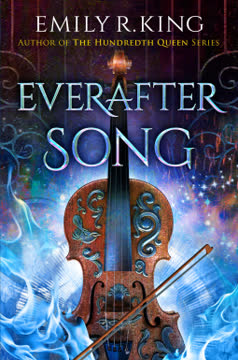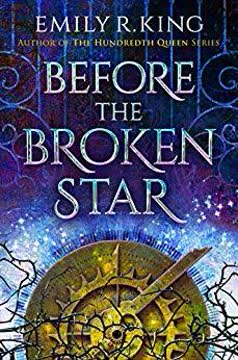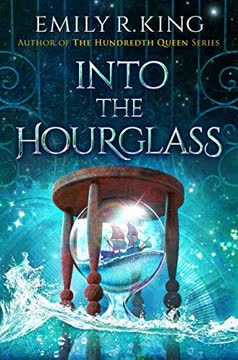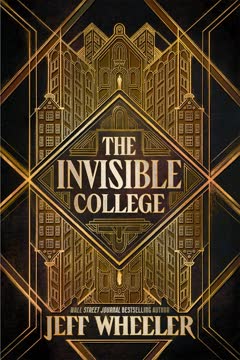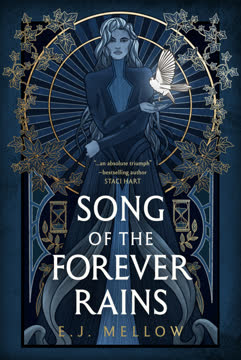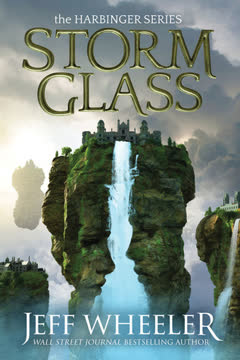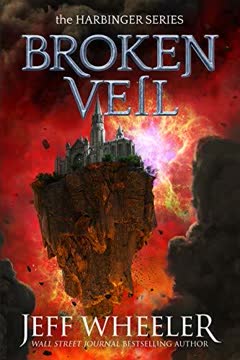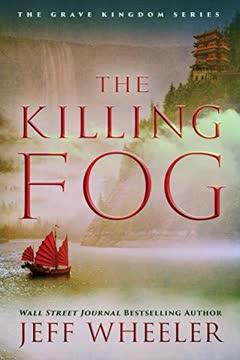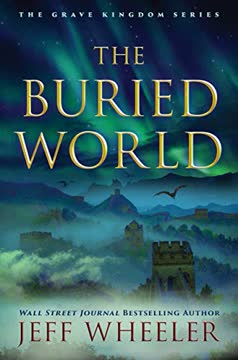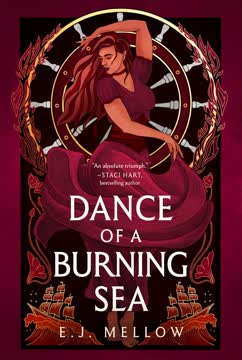Plot Summary
Prophecy of Fire and Fate
The story opens with a vision: the Everwoods, the heart of all worlds, will burn. Mother Madrona, the ancient tree spirit, foresees two possible endings—one of destruction by fire, the other of hope through sacrifice. The fate of the worlds hinges on a knight with a talisman of time and an immortal sword, set against a wicked prince. This prophecy sets the tone for a tale where destiny, choice, and the cyclical nature of time are inextricably linked. The reader is drawn into a world where the boundaries between fate and agency blur, and where the cost of salvation may be as great as the cost of loss. The emotional weight of impending doom and the hope for redemption permeate the narrative from the very beginning.
Fugitive with a Clock Heart
Everley Donovan, orphaned and accused of sorcery for her mechanical clock heart, hides from Queen Aislinn's forces. Her uncle's death and the loss of her home have left her adrift, but she finds solace in the loyalty of friends—Jamison, her former husband; Osric, the elf; and the Fox and the Cat, her steadfast companions. The group's bond is tested as they evade capture, haunted by the queen's lies and the trauma of violence. Everley's heart, both literal and metaphorical, becomes a symbol of her otherness and resilience. The emotional landscape is one of grief, longing, and the desperate hope for a place to belong, as Everley clings to the remnants of her past while forging a new identity in exile.
Prince's Return, Spirits Unbound
The prince, Killian Markham, returns, bringing with him the stolen infinity sandglass—a timepiece of unimaginable power. He confronts Everley, drawing her into visions of the past and possible futures, including the legendary triad war and the devastation of her family. Markham's manipulation and immortality make him a formidable adversary, and his motives—rooted in loss, ambition, and a twisted sense of destiny—are revealed through their tense encounters. Everley's spirit-jumping ability, her connection to the immortal sword, and her unresolved hatred for Markham drive her deeper into the web of fate. The emotional arc is fraught with tension, betrayal, and the haunting specter of choices that echo across time.
The Infinity Sandglass Revealed
Markham's mastery of the infinity sandglass allows him to traverse worlds and manipulate time, but his true goal is to access the giants' world, the Silver-Clouded Plain. He plants enchanted skyseeds, growing a skystalk that bridges realms, and sets in motion a plan to awaken the ancient giants. Everley and her allies, pursued by both human and elven authorities, must navigate political intrigue, personal guilt, and the ever-present threat of Markham's machinations. The sandglass becomes a symbol of both hope and peril, its power coveted and feared. The emotional stakes rise as Everley faces the possibility of losing everything she loves to the relentless march of time and ambition.
Skystalk to the Giants' World
The skystalk, a colossal beanstalk-like bridge, grows into the clouds, drawing the attention of all realms. Everley, Jamison, and Osric race to intercept Markham before he can reach the giants' world. The climb is perilous, marked by physical danger and the psychological weight of past traumas. The elven guard, led by Commander Asmer, intervenes, capturing Everley and her friends. The group is divided, trust is strained, and the looming threat of the giants' awakening casts a shadow over their every move. The emotional core is one of determination in the face of overwhelming odds, and the fear that even the greatest efforts may not be enough to avert catastrophe.
Elven Queen's Ultimatum
Queen Imelda of the elves arrives, asserting her authority and claiming responsibility for her brother's crimes. She detains Everley and her companions, promising to capture Markham herself. The elven perspective on history, power, and the role of humans is revealed, deepening the story's exploration of prejudice, legacy, and the burden of leadership. Everley's frustration mounts as she is sidelined, her agency curtailed by those who claim to know best. The emotional tension is heightened by the sense of being trapped—by politics, by history, and by the inexorable pull of fate.
Hidden Doors and Old Wounds
While imprisoned in Elderwood Manor, Everley and Jamison discover hidden passageways and confront the ghosts of their pasts. The group's bonds are tested as guilt over past actions—especially the shooting of a constable—threatens to unravel them. The emotional wounds of exile, loss, and unfulfilled dreams are laid bare, but so too are moments of tenderness, humor, and hope. The discovery of family heirlooms and secret rooms becomes a metaphor for the hidden pain and resilience within each character. The chapter is a quiet interlude, rich with introspection and the bittersweet ache of what might have been.
Portals and Pirate Alliances
Everley, Jamison, and Osric journey through portals to the Land Under the Wave, seeking the help of pirate giants Redmond and Neely. The world is in turmoil, with finfolk and merrows vying for control, and the threat of time moving differently across realms adds urgency to their quest. The alliance with the giants is uneasy, built on mutual need rather than trust. The emotional landscape is one of uncertainty, as old enemies become reluctant allies and the boundaries between friend and foe blur. The sense of adventure is tinged with the knowledge that every choice carries consequences that ripple across worlds.
The Bard's Secret Violin
The group's journey leads them to the Silver-Clouded Plain, where they seek the Bard—the immortal luthier who crafted the Creator's violin. Markham's true goal is revealed: to obtain Nightingale, a violin capable of awakening the sleeping giants. The Bard, embittered by exile and loss, is swayed by Markham's promises, and the artifact changes hands. Everley's confrontation with the Bard and the marionette Maisie is a moment of existential reckoning, as she faces the limits of her power and the cost of betrayal. The emotional arc is one of desperation, as the last hope for peace slips away.
The Everafter Song's Power
Markham, armed with Nightingale and the completed everafter song, awakens the ancient giants, unleashing chaos upon the Land of the Living. The power of music—its ability to create, to heal, and to destroy—is at the heart of this chapter. The giants' awakening is both awe-inspiring and terrifying, a force of nature that cannot be contained. Everley and her allies scramble to warn the realms, rally defenses, and confront the reality that the world as they know it may be ending. The emotional tone is one of awe, fear, and the desperate hope that love and courage can stand against the tide of destruction.
Betrayals and Broken Crowns
Markham's ambition reaches its zenith as he murders his sister Imelda, seizes the elven throne, and betrays even his most loyal followers. The cost of power is laid bare, as love, loyalty, and family are sacrificed on the altar of destiny. Everley and Jamison are forced to confront the limits of their agency, the pain of betrayal, and the weight of choices made in the name of survival. The emotional arc is one of heartbreak, anger, and the grim determination to fight on, even when hope seems lost.
The Giants Awaken
The ancient giants, now kreachers twisted by centuries of sleep and rage, march upon the human world, leaving devastation in their wake. Everley, Jamison, and their allies rally an army of elves, giants, and magical creatures for a last stand in the ruins of the Black Forest. The battle is brutal, chaotic, and costly, with friends and foes falling alike. The emotional core is one of sacrifice, as each character faces their mortality and the possibility that their efforts may be in vain. The sense of impending doom is palpable, but so too is the fierce love that binds the group together.
War on the Black Forest
The armies clash in a cataclysmic confrontation, with Everley leading the charge on her white mare. The battle is a tapestry of heroism, loss, and the indomitable will to survive. The cost of victory is steep, and the line between triumph and tragedy is razor-thin. The emotional arc is one of catharsis, as old wounds are confronted, debts are paid, and the true meaning of heroism is revealed—not in victory, but in the willingness to fight for those you love, even in the face of certain death.
The Last Stand of Time
Wounded and dying, Everley confronts Markham in the burning Everwoods. With the help of Father Time and the immortal sword Centurion, she drags Markham's spirit into the realm between life and death and strikes the final blow. The cost is immense: her own life, her memories, and the world as she knows it. The emotional climax is one of release, as Everley lets go of hatred, forgives her enemy, and chooses to end the cycle of violence. The burning of the Everwoods becomes both an ending and a beginning, a moment of cosmic significance where time itself is reset.
Sacrifice in the Everwoods
In the aftermath, Everley awakens in a place outside time, surrounded by daisies and the music of creation. Father Time explains that her sacrifice has healed the fracture in the timeline, erasing Markham's existence and undoing the pain he caused. The cost is the loss of her memories, her friends, and the life she fought for. Yet, there is hope: the heart remembers what the mind forgets, and the possibility of reunion lingers. The emotional tone is bittersweet, a blend of grief, gratitude, and the quiet joy of a world made whole.
The Timeline Restored
In a new timeline, Everley is an apprentice clockmaker, her family alive, her world at peace. She meets Jamison Callahan for the first time—again—and feels the stirrings of recognition and love. The cycles of pain and loss have been broken, but the connections forged in another life remain, echoing in dreams and the heart's deepest places. The emotional arc is one of healing, renewal, and the enduring power of love to transcend even the boundaries of time and memory.
In Another Time
The story closes with Everley, surrounded by family and possibility, writing stories of magical worlds and girls with clock hearts. The pain of the past is gone, but the hope and wonder remain. The narrative comes full circle, affirming that even in the face of loss and sacrifice, the heart's capacity for love, imagination, and resilience endures. The emotional resonance is one of peace, fulfillment, and the quiet certainty that every ending is also a beginning.
Characters
Everley Donovan
Everley is the heart and soul of the narrative—a young woman marked by loss, hunted for her clockwork heart, and driven by a fierce sense of justice. Her relationships are complex: she is Jamison's former wife and enduring love, a surrogate sister to the Fox and the Cat, and a reluctant hero chosen by fate. Psychologically, Everley is defined by trauma, guilt, and the longing for belonging, but also by an indomitable will and capacity for love. Her journey is one of self-acceptance, learning to forgive, and ultimately sacrificing everything to save the worlds. Her development is a study in resilience, as she transforms from fugitive to savior, her heart—both mechanical and emotional—becoming the axis upon which fate turns.
Jamison Callahan
Jamison is Everley's anchor—a nobleman, violinist, and former naval officer whose love for Everley is unwavering. His role is both protector and partner, but he is also burdened by his own losses and the knowledge of a prophecy that foretells his death. His psychological landscape is marked by loyalty, self-sacrifice, and the struggle to reconcile duty with desire. Jamison's development is shaped by his willingness to risk everything for love, his acceptance of vulnerability, and his ultimate faith in the possibility of a better future, even when all hope seems lost.
Killian Markham
Markham is the story's antagonist—a prince cursed with immortality, driven by grief, ambition, and a warped sense of destiny. His relationships are fraught: he is Imelda's brother, Harlow's lover, and Everley's nemesis. Psychologically, Markham is a study in obsession, unable to let go of the past or accept the limits of mortality. His actions are both monstrous and pitiable, rooted in a desperate need for control and meaning. Over the course of the story, he becomes both more human and more monstrous, his final defeat a testament to the destructive power of unchecked ambition and the redemptive possibility of forgiveness.
Osric Llewellyn
Osric is Everley's steadfast ally, an elf estranged from his homeland and haunted by the loss of his sister. His role is that of guide, confidant, and comic relief, but beneath his wit lies a deep well of pain and longing. Psychologically, Osric grapples with identity, aging, and the meaning of home. His development is marked by his decision to stop clinging to youth, to reconcile with his past, and to embrace the present. His journey is one of acceptance, both of himself and of the inevitability of change.
Claret Rees (the Cat)
Claret is one half of the Fox and the Cat, Everley's closest friends. Her relationship with Laverick is both romantic and redemptive, offering her a sense of belonging she has never known. Psychologically, Claret is marked by trauma from her time enslaved by the merrows, guilt over violence, and a deep-seated fear of abandonment. Her development is a testament to the healing power of love and friendship, as she learns to trust, to fight for her own happiness, and to forgive herself.
Laverick Driscoll (the Fox)
Laverick is Claret's partner in crime and in life, a quick-witted, daring woman haunted by the accidental killing of a constable. Her relationship with Claret is her anchor, but she is also fiercely loyal to Everley and the group. Psychologically, Laverick struggles with guilt, the weight of her past, and the fear that she is irredeemable. Her development is one of self-forgiveness, the pursuit of a new life, and the courage to face the consequences of her actions.
Queen Imelda
Imelda is Markham's sister and the queen of the elves, a figure torn between duty, love, and the shadow of her brother's crimes. Her relationship with Markham is fraught with guilt, rivalry, and unresolved grief. Psychologically, Imelda is defined by the weight of expectation, the pain of loss, and the struggle to do what is right in a world that often punishes compassion. Her development is marked by her willingness to confront the past, to accept responsibility, and to make the ultimate sacrifice for her people.
Commander Asmer
Asmer is the elven guard's commander, a character who navigates gender identity through glamour and magic. Their relationship with Imelda is one of loyalty and unspoken affection, while their interactions with Everley are marked by respect and shared purpose. Psychologically, Asmer embodies the theme of authenticity—striving to live as their true self in a world that demands conformity. Their development is a quiet assertion of identity, courage, and the power of self-acceptance.
Harlow Glaspey
Harlow is Markham's lover and accomplice, a woman whose loyalty is both her strength and her undoing. Her relationship with Markham is one-sided, rooted in longing and the hope for belonging. Psychologically, Harlow is defined by abandonment, the need for validation, and the willingness to do anything for love. Her development is a cautionary tale of the dangers of devotion without self-worth, culminating in betrayal and a tragic end.
Father Time
Father Time is the story's cosmic overseer, a being of immense power and inscrutable motives. His relationship with Everley is both paternal and distant, offering guidance but withholding comfort. Psychologically, Father Time is a study in detachment, burdened by the knowledge of all possible futures and the limits of intervention. His development is subtle, marked by moments of vulnerability and the acknowledgment that even time itself is not immune to the pain of loss and the hope for redemption.
Plot Devices
Prophecy and Dual Endings
The story is anchored by a prophecy of two possible endings: one of destruction, one of hope. This device creates a sense of inevitability while allowing for agency, as characters struggle to determine which path will come to pass. The prophecy's ambiguity fuels tension, as every choice is weighted with cosmic significance.
The Clock Heart and Immortal Sword
Everley's clock heart and the sword Centurion are both literal and metaphorical keys to the story. The heart marks her as an outsider but also as uniquely capable of changing fate. The sword, forged from a fallen star, is the only weapon capable of ending immortality and resetting the timeline. These artifacts drive the plot and embody the themes of sacrifice, resilience, and the power of the individual.
The Infinity Sandglass
The sandglass allows for travel between worlds, visions of past and future, and the blurring of linear time. It is both a tool of hope and a weapon of destruction, coveted by all and central to Markham's schemes. Its presence enables foreshadowing, flashbacks, and the exploration of alternate realities, deepening the story's meditation on fate and choice.
Spirit Jumping and Portals
Everley's ability to spirit jump and the use of portals between worlds serve as metaphors for transformation, escape, and the permeability of identity. These devices allow for rapid shifts in setting, the convergence of disparate storylines, and the exploration of psychological landscapes. They also reinforce the theme that the boundaries between worlds—and between people—are more fragile than they appear.
Music as Creation and Destruction
Music is both a source of beauty and a weapon, capable of creating worlds and unleashing devastation. The everafter song, in particular, is the key to awakening the giants and resetting the timeline. Its power is both literal and symbolic, representing the dual nature of art and the capacity of creation to both heal and harm.
Narrative Structure and Foreshadowing
The narrative is structured around cycles—of time, of trauma, of hope and loss. Visions, dreams, and prophecies foreshadow key events, while mirrored scenes (such as the burning of the Everwoods and the restoration of the timeline) create a sense of symmetry and inevitability. The use of epilogue and alternate timelines reinforces the story's central question: can we ever truly escape the past, or are we always, in some sense, living in another time?
Analysis
Everafter Song is a sweeping fantasy that interrogates the nature of fate, agency, and the cost of redemption. At its core, the novel is a meditation on trauma—personal, generational, and cosmic—and the ways in which love, memory, and sacrifice can both bind and liberate us. Through the lens of Everley's journey, the story explores what it means to be othered, to carry the weight of loss, and to choose hope in the face of despair. The narrative's use of prophecy, time manipulation, and alternate realities invites readers to question the boundaries between destiny and free will, suggesting that while we may be shaped by the past, we are not wholly defined by it. The emotional arc is one of catharsis: the pain of loss is not erased, but transformed, and the possibility of healing is held out as both a gift and a responsibility. Ultimately, Everafter Song is a testament to the enduring power of love, the necessity of forgiveness, and the belief that even in the darkest of times, the heart remembers—and creates—its own everafter.
Last updated:
Review Summary
Everafter Song received mostly positive reviews, with readers praising the world-building, character development, and satisfying conclusion to the trilogy. Many enjoyed the found family aspect and the exploration of themes like sacrifice and love. Some criticized pacing issues and predictability. The ending was divisive, with some finding it rushed or disappointing, while others thought it was perfect. Overall, fans of YA fantasy appreciated the series' creativity and emotional depth, though a few felt it didn't meet their expectations.
